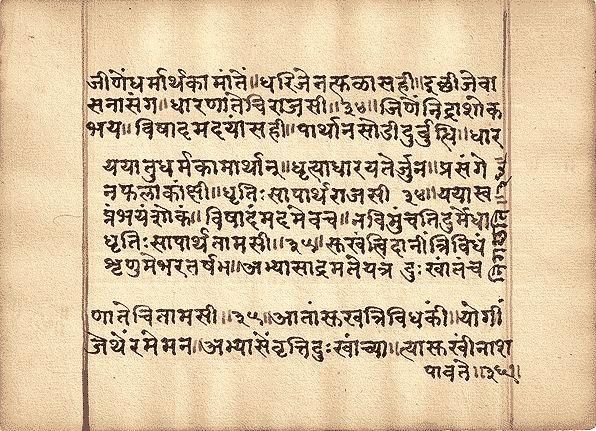
yayā tu dharma-kāmārthān dhṛtyā dhārayate ‘rjuna
prasaṅgena phalākāṅkṣī dhṛtiḥ sā pārtha rājasī
Update RequiredTo play the media you will need to either update your browser to a recent version or update your Flash plugin.
he arjuna (O Arjuna),
he pārtha (O son of Pṛthā!),
yayā dhṛtyā tu (but by which firmness) prasaṅgena (by attachment) phalākāṅkṣī (desiring the fruit) dharma-kāmārthān (law, desire and wealth) dhārayate (he causes to hold),
sā dhṛtiḥ (that firmness) rājasī [
asti]
(is rajasic).
| yayā |
– |
yat sn. 3n.1 f. – by which; |
| tu |
– |
av. – but, then, or, and; |
| dharma-kāmārthān |
– |
dharma-kāma-artha 2n.3 m.; DV: dharmaś ca kāmaś cārthaś ceti – law, desire and wealth (from: √dhṛ – to hold, dharma – the law; √kam –to wish, to love, to long for, kāma – desire, love, pleasure; √arth – to strive to obtain, to desire, to request, artha – purpose, advantage, concern, object, wealth); |
| dhṛtyā |
– |
dhṛti 3n.1 f. – by firmness, by determination (√dhṛ – to hold, PP dhṛta – held); |
| dhārayate |
– |
√dhṛ (to hold up) Praes. caus. Ā 2v.1 – he causes to hold, he understands; |
| arjuna |
– |
arjuna 8n.1 m. – white, clear, Arjuna; |
| prasaṅgena |
– |
pra-saṅga 3n.1 m. – by attachment (from: sam-√gam – come together or √sañj – to attach, to stick, to embrace, saṅga – clinging, contact, relation, desire, attachment); |
| phalākāṅkṣī |
– |
phala-ākāṅkṣin 1n.1 m.; TP: yaḥ phalam ākāṅkṣati saḥ – desiring the fruit (from: √phal – to ripen; phala – fruit, result; ā-√kāṅkṣ – to desire, to expect, ākāṅkṣā – eager desire, longing; -in, -min, -vin – sufixes meaning one who possesses); |
| dhṛtiḥ |
– |
dhṛti 1n.1 f. – firmness, determination (√dhṛ – to hold, PP dhṛta – held); |
| sā |
– |
tat sn. 1n.1 f. – that; |
| pārtha |
– |
pārtha 8n.1 m. – O son of Pṛthā (from: √pṛth – to extend, pṛthā – Kuntī, mother of the sons of Pāṇḍu); |
| rājasī |
– |
rājasī 1n.1 f. – pertaining to rajas, rajasic (from: √rañj – to be dyed, be excited, be delighted, rajas – coloured, dust, passion, one of the three guṇas); |
yayā → yathā (as);
dharma-kāmārthān → karma-kāmārthān (activities, desires and wealth);
prasaṅgena → prasannena (by satisfaction);
sā → yā (which);
yayā tu dharma-kāmārthān dharmaś ca kāmaś cārthaś ca dharma-kāmārthās tān dharma-kāmārthān dhṛtyā yayā dhārayate manasi nityam eva kartavya-rūpān avadhārayati he’rjuna, prasaṅgena yasya yasya dharmāder dhāraṇa-prasaṅgas tena tena prasaṅgena phalākāṅkṣī ca bhavati yaḥ puruṣaḥ, tasya dhṛtir yā sā pārtha rājasī
phalākāṅkṣī puruṣaḥ prakṛṣṭasaṅgena dharmakāmārthān yayā dhṛtyā dhārayate, sā rājasī / dharmakāmārthaśabdena tatsādhanabhūtā manaḥprāṇendriyakriyā lakṣyante / phalākāṅkṣīty atrāpi phalaśabdena rājasatvād dharmakāmārthā eva vivakṣitāḥ / ato dharmakāmārthāpekṣayā manaḥprabhṛtīnāṃ kriyā yayā dhṛtyā dhārayate, sā rājasīty uktaṃ bhavati
rājasīṃ dhṛtim āha yayā tv iti | yayā tu dhṛtyā dharmārtha-kāmān prādhānyena dhārayate na vimuñcati | tat-saṅgena phalākāṅkṣī ca bhavati sā rājasī dhṛtiḥ
no commentary up to the verse BhG 18.37
sa-kāma-vidvat-prasaṅgena phalākāṅkṣī puruṣaḥ | yayā dharmādīn tat-sādhana-bhūtā manaḥ-prāṇendriya-kriyā dhārayatee, sā dhṛtiḥ rājasī

